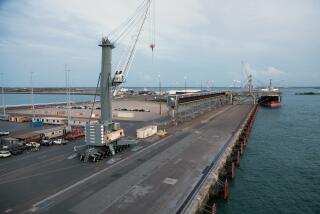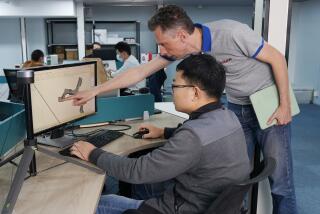A WORLD REPORT SPECIAL EDITION ON THE PACIFIC RIM : THE SOUTH RIM : Market Focus : U.S. Firms Settle on Sydney : Businesses choose Australia for regional offices over uncertainty of Hong Kong, expense of Singapore.
- Share via
SYDNEY, Australia — When Novell, a U.S. computer software giant, decided to establish a regional headquarters to oversee its Asian business, the company looked first at Hong Kong and Singapore as possible bases.
Instead of following other U.S. firms into those cities, however, Novell ultimately chose to put its regional offices in Sydney.
While the influx has yet to turn into a stampede, a surprising number of blue-chip firms are making the move Down Under despite the rigors of the seven-hour flying time from the Australian coast to the heart of Asia.
“Sydney just came out ahead,” said Arthur Erlich, regional manager for Novell. “High costs and the uncertainty of 1997 ruled out Hong Kong. When we compared Sydney with Singapore, we also found costs of facilities significantly cheaper.”
In addition to the expense argument, Novell found that the turnover of technical personnel in Singapore was high because of competition fueled by the country’s low unemployment rate. In Australia, technical personnel often stay in their jobs for years.
Asked about the flight time to Asia, Erlich laughed and noted that a good slice of the company’s business is in Australia. “It doesn’t make any difference where you base. You’re going to live on airplanes anyway.”
After setting up its sales and marketing offices in Australia’s biggest city, Novell opened a regional service center in the city as well because salaries and the cost of office space were generally lower than in Asian cities. It now has about 100 employees here.
*
Because of the high proportion of Asians among recent immigrants to Australia, the company was able to hire technical staff who are fluent in Chinese, Korean and Indonesian. Hence, customers in Asia can be routed automatically to an engineer in Sydney who speaks their language.
“With its high-technology and telecommunications infrastructure, regional companies have discovered that Sydney makes a lot of sense for them as a base,” said Helen Petersen, who works for the Office of Economic Development in New South Wales, the state of which Sydney is the capital.
In addition to its business attractions, Australia also offers a high quality of life to Americans and other expatriates who embrace Sydney’s laid-back lifestyle.
By one estimate, 16 major firms set up regional offices in Sydney in the last year.
Among the recent converts: Hong Kong-based Cathay Pacific Airlines recently moved its data processing center to Sydney. American Express prepares and mails all of its bills for the East Asian region from a regional office here. A U.S. fiber-optics firm, Methode Electronics, decided to move its regional headquarters to Sydney from Singapore, while Sara Lee makes its cakes for sales across Asia here.
Even the Hong Kong Jockey Club has moved its international headquarters here, ahead of the 1997 hand-over of Hong Kong to China.
In addition to quality-of-life arguments, the state and federal governments in Australia have been offering substantial tax benefits to companies to encourage them to set up in Australia. The federal government gives tariff breaks on imported raw materials to companies that export. In some cases, states are competing against each other by offering more favorable tax deals.
Michael Davis, former regional director for the Swedish drug firm Astra Pharmaceuticals, said his company set up manufacturing, marketing and technical-support facilities in Australia in part because of the Pacific Rim country’s rigorous protection of intellectual property rights, which is important in patent-dependent fields such as pharmaceuticals, as well as for the pool of highly educated technical personnel available.
“It’s not the amount of labor, it’s the quality of labor,” Davis said.
He also mentioned the size of the domestic market as a factor in establishing a manufacturing base here.
Perhaps the most unusual use of Australia as a regional base comes from the Singapore Straits Times, the main English-language daily in Singapore.
According to Leslie Fong, the newspaper’s editor, the company had trouble finding qualified editors in Singapore, and bringing expatriates to the island nation is an expensive proposition.
So the Straits Times opened an on-line regional editing office in Sydney, hiring Australian editors at local wage rates. The editors take in raw copy written by Singapore reporters in their home office and edit the copy, lay out the pages and ship them back to Singapore electronically.
“It’s working out terrifically,” Fong said.
Australian columnist Paddy McGuiness reacted to the move by warning humorously of an Australian “white-collar coolie class undercutting the rising living standards of journalists in rapidly growing countries.”
More to Read
Sign up for Essential California
The most important California stories and recommendations in your inbox every morning.
You may occasionally receive promotional content from the Los Angeles Times.













